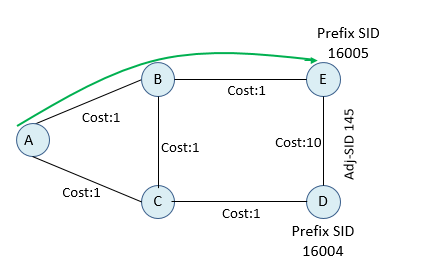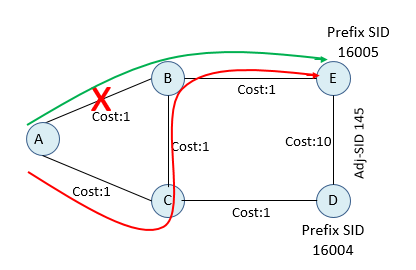Before Segment Routing was introduced, IP FRR and Loop-Free Alternates (LFAs) were not widely deployed. In these implementations the level of coverage depended on the network topology. When SR combined with FRR techniques, Fast Reroute can deliver 100% network coverage regardless of the topology. That is called TI-LFA (Topology Independent – Loop Free Alternate)
Here are some functions and benefits of TI-LFA;
- It is IGP automated. It is very simple to understand and deploy. No need to run and manage additional protocol.
- It can work and provide less than 50ms switch-over in any topology.
- TI-LFA finds and calculates the post-convergence shortest path to every possible destination.
- It can provide link protection, node protection and SRLG protection.
There are some certain rules for FRR to work.
Here is the formula;
Assume;
S = Source Router
D = Destination Router
N = Alternate Next Hop Router
E = Primary Next Hop Router
If Total Cost of N to D < Total cost of S to N + Total Cost of S to D FRR will install the backup route. Otherwise it will not be calculated as backup not to create micro loops in the network. SR TI-LFA is IGP automated, we don’t need to worry about this formula.
Let’s examine a few topology to understand how TI-LFA with a basic example. In the following example, IP FRR may also work as well as TI-LFA.
Case Study
According to below topology;

Cost between Node-E and Node-D is 10 and all other links have a cost of 1.
Prefix SID of Node-D: 16004
Prefix SID of Node-E: 16005
Without TI-LFA enables, Node-A will have the following entry in its SR forwarding table;
Incoming Active Segment: NULL Operation: PUSH 16005 (PHP is enable by default) Egress Interface: The interface towards to Node-B
If we enable TI-LFA Link protection on Node-A, the following entries will be installed to the SR forwarding table; (And it is IGP automated)
Incoming Active Segment: NULL Operation: PUSH 16005 (Prefix-SID of Node-E) Egress Interface: The interface towards to Node-B TI-LFA Backup: PUSH 16005, Interface towards to Node-C
